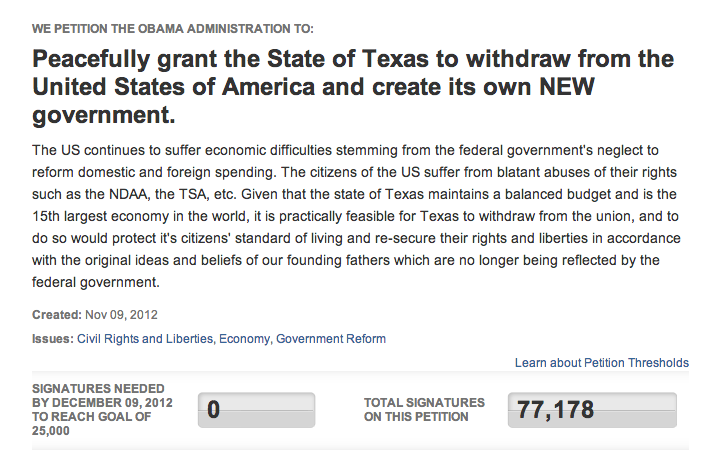After President Barack Obama was reelected last week, several petitions to secede appeared on the White House website. The petition feature of the site promises that “if a petition meets the signature threshold [of 25,000 signatures within 30 days], it will be reviewed by the Administration and we will issue a response.” The Houston Chronicle reports that by 3:40 PM EST, the petition to allow Texas to secede had already accumulated over 25,000 signatures. At the time of this writing, it has over 77,000 signatures.
Petitions on behalf of other states have received less attention and fewer signatures, but several have met or are approaching the 25,000 threshold, as well. Louisiana (29,000), Florida (23,000), Georgia (22,000), Alabama (21,300), Tennessee (20,700), and North Carolina (20,200) have all accrued a substantial number of supporters.
On more than one occasion, Texans (both officials and non-officials) have suggested that their state “has the right” to secede. Texas Governor Rick Perry has disavowed the online movement to secede, despite having previously acknowledged that secession might be an option. In 2009, the state legislature passed a resolution asserting state sovereignty—a resolution Governor Perry supported—although it has no binding effect on the federal government.
Although Texas would likely be among the first to defy a ruling by the U.S. Supreme Court, it bears mentioning that in 1869, the Court held very clearly that a state (in that case, not surprisingly, Texas) does not have the “right” to unilaterally secede from the Union:
When, therefore, Texas became one of the United States, she entered into an indissoluble relation. All the obligations of perpetual union, and all the guaranties of republican government in the Union, attached at once to the State. The act which consummated her admission into the Union was something more than a compact; it was the incorporation of a new member into the political body. And it was final. The union between Texas and the other States was as complete, as perpetual, and as indissoluble as the union between the original States. There was no place for reconsideration, or revocation, except through revolution, or through consent of the States.
As the post-election frenzy dies down and people move on with their lives, we will likely see this secession movement fade into history. In the meantime, however, we will have to endure the fervent secessionists brandishing their “Don’t Mess With Texas” paraphernalia (amusingly, a reference only to the state’s anti-littering campaign) and raising a fuss.
